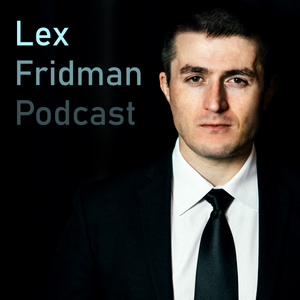![DataCafé - [Bite] Wordle: Winning against the algorithm](https://storage.googleapis.com/goodpods-images-bucket/episode_images/642929816cfd39f9681cadadc49df0f26f8cf1423b4eb741a37f7b1427a2b0af.avif)
[Bite] Wordle: Winning against the algorithm
03/14/22 • 11 min
The grey, green and yellow squares taking over social media in the last few weeks is an example of the fascinating field of study known as Game Theory. In this bite episode of DataCafé we talk casually about Wordle - the internet phenomenon currently challenging players to guess a new five letter word each day.
Six guesses inform players what letters they have gotten right and if they are in the right place. It’s a lovely example of the different ways people approach game strategy through their choice of guesses and ways to use the information presented within the game.
Wordles
- Wordle - the original
- Absurdle - it's Wordle but it fights you!
- Nerdle - Maths Wordle
- Quordle - when one Wordle is not enough!
- Foclach - Irish Wordle
Analysis
- Statistical analysis of hard-mode Wordle with Matlab by Matt Tearle (youtube)
- The science behind Wordle by Ido Frizler (medium.com)
Some links above may require payment or login. We are not endorsing them or receiving any payment for mentioning them. They are provided as is. Often free versions of papers are available and we would encourage you to investigate.
Recording date: 15 Feb 2022
Intro music by Music 4 Video Library (Patreon supporter)
Thanks for joining us in the DataCafé. You can follow us on twitter @DataCafePodcast and feel free to contact us about anything you've heard here or think would be an interesting topic in the future.
The grey, green and yellow squares taking over social media in the last few weeks is an example of the fascinating field of study known as Game Theory. In this bite episode of DataCafé we talk casually about Wordle - the internet phenomenon currently challenging players to guess a new five letter word each day.
Six guesses inform players what letters they have gotten right and if they are in the right place. It’s a lovely example of the different ways people approach game strategy through their choice of guesses and ways to use the information presented within the game.
Wordles
- Wordle - the original
- Absurdle - it's Wordle but it fights you!
- Nerdle - Maths Wordle
- Quordle - when one Wordle is not enough!
- Foclach - Irish Wordle
Analysis
- Statistical analysis of hard-mode Wordle with Matlab by Matt Tearle (youtube)
- The science behind Wordle by Ido Frizler (medium.com)
Some links above may require payment or login. We are not endorsing them or receiving any payment for mentioning them. They are provided as is. Often free versions of papers are available and we would encourage you to investigate.
Recording date: 15 Feb 2022
Intro music by Music 4 Video Library (Patreon supporter)
Thanks for joining us in the DataCafé. You can follow us on twitter @DataCafePodcast and feel free to contact us about anything you've heard here or think would be an interesting topic in the future.
Previous Episode

Series 2 Introduction
Looks like we might be about to have a new Series of DataCafé!
Recording date: 15 Feb 2022
Intro music by Music 4 Video Library (Patreon supporter)
Thanks for joining us in the DataCafé. You can follow us on twitter @DataCafePodcast and feel free to contact us about anything you've heard here or think would be an interesting topic in the future.
Next Episode

Deep Learning Neural Networks: Building Trust and Breaking Bias
We explore one of the key issues around Deep Learning Neural Networks - how can you prove that your neural network will perform correctly? Especially if the neural network in question is at the heart of a mission-critical application, such as making a real-time control decision in an autonomous car. Similarly, how can you establish if you've trained your neural network at the heart of a loan decision agent with a prebuilt bias? How can you be sure that your black box is going to adapt to critical new situations?
We speak with Prof. Alessio Lomuscio about how Mixed Integer Linear Programs (MILPs) and Symbolic Interval Propagation can be used to capture and solve verification problems in large Neural Networks. Prof. Lomuscio leads the Verification of Autonomous Systems Group in the Dept. of Computing at Imperial College; their results have shown that verification is feasible for models in the millions of tunable parameters, which was previously not possible. Tools like VENUS and VeriNet, developed in their lab, can verify key operational properties in Deep Learning Networks and this has a particular relevance for safety-critical applications in e.g. the aviation industry, medical imaging and autonomous transportation. Particularly importantly, given that neural networks are only as good as the training data that they have learned from, it is also possible to prove that a particular defined bias does or does not exist for a given network. This latter case is, of course, important for many social or industrial applications: being able to show that a decisioning tool treats people of all genders, ethnicities and abilities equitably.
Interview Guest
Our interview guest Alessio Lomuscio is Professor of Safe Artificial Intelligence in the Department of Computing at Imperial College London. Anyone wishing to contact Alessio about his team's verification technology can do so via his Imperial College website, or via the Imperial College London spin-off Safe Intelligence that will be commercialising the AI verification technology in the future.
Further Reading
- Publication list for Prof. Alessio Lomuscio (via Imperial College London)
- Paper on Formal Analysis of Neural Network-based Systems in the Aircraft Domain using the VENUS tool (via Imperial College London)
- Paper on Scalable Complete Verification of ReLU Neural Networks via Dependency-based Branching (via IJCAI.org)
- Paper on DEEPSPLIT: An Efficient Splitting Method for Neural Network Verification via Indirect Effect Analysis (via IJCAI.org)
- Team: Verification of Autonomous Systems Group, Department of Computing, Imperial College London
- Tools: VENUS and VeriNet
Some links above may require payment or login. We are not endorsing them or receiving any payment for ment
Thanks for joining us in the DataCafé. You can follow us on twitter @DataCafePodcast and feel free to contact us about anything you've heard here or think would be an interesting topic in the future.
If you like this episode you’ll love
Episode Comments
Generate a badge
Get a badge for your website that links back to this episode
<a href="https://goodpods.com/podcasts/datacaf%c3%a9-241830/bite-wordle-winning-against-the-algorithm-26902035"> <img src="https://storage.googleapis.com/goodpods-images-bucket/badges/generic-badge-1.svg" alt="listen to [bite] wordle: winning against the algorithm on goodpods" style="width: 225px" /> </a>
Copy




